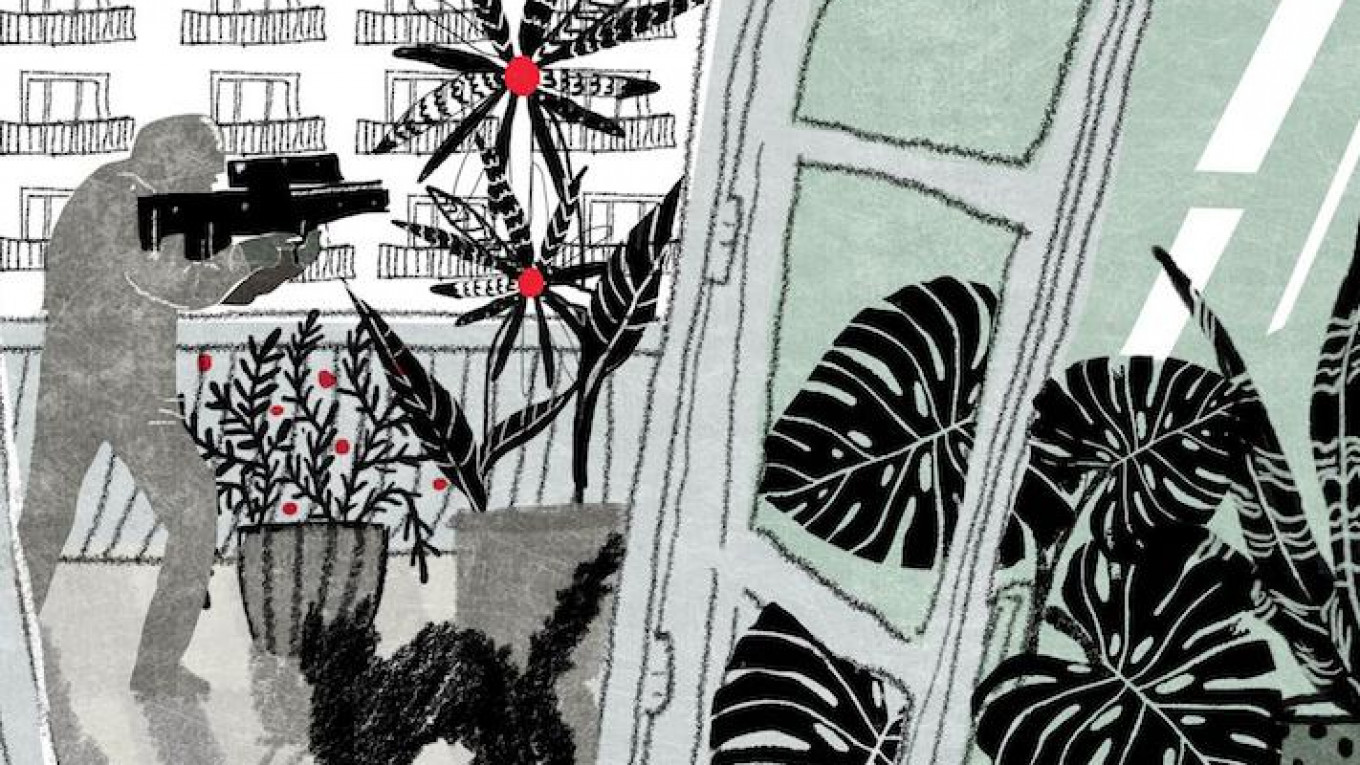Anna and Larissa, sisters in their 30s, have lived in the same apartment their whole lives. The women live on the 11th floor of a typical Soviet apartment block, on a typical street, and in the middle of a typical workers’ suburb in St. Petersburg. Life there has always been predictable, if not outright boring.
On the morning of Aug. 17, the sisters were surprised when FSB agents rang their doorbell.
“We are conducting a special operation today to neutralize criminals in the apartment below yours, and we might need your apartment,” one of the men told them, before telling the women to wait in a nearby school.
Three hours later, residents reported that FSB officers had set up a grenade launcher on the sisters’ balcony, where their cat often perched, and fired it into apartment number 614 on the floor below. The agents then stormed the apartment.
According to Russia’s Investigative Committee, the apartment had been home to four Islamic militants from Kabardino-Balkaria (KBR), a region in Russia’s North Caucasus region. The men were allegedly associates of extremist Khizir Likhov, 25, a KBR native on the Russian wanted list since 2014. Just three days earlier, security forces in Kabardino-Balkaria had killed Likhov in a nighttime shootout on the Caucasus highway.
After FSB agents made the links back to his associates in St. Petersburg, the preparations for a special operation began. A day before the sisters received the knock on their door, ambulances were moved near the building, and riot police units were relocated to the area.
The next morning, when the operation was in full swing, Ivan, 40, a resident in the same building, woke up to the sound of an explosion. His young son thought it was thunder, but Ivan saw nothing but blue sky. It was only when he took his son to play in the sandbox outside that he saw men in balaclavas surrounding the building.
“Is this a drill?” Ivan asked one of them. “No, this is for real,” the masked man answered.
The next explosions and gunshots were heard a few hours later, at 11:20 a.m., when FSB officers in the sisters’ apartment broke through the floorboards to toss a gas grenade at the militants.
By this time, a television crew had arrived, and had apparently obstructed the operation. To get rid of the television crew, the FSB carried a supposedly wounded officer out of the stairwell on a stretcher and loaded him into an ambulance. The journalists drove off behind them in pursuit.
Four men were killed that day: Zalim Shebzukhov, Astemir Sheriyev, Vyacheslav Nyrov and a fourth man whose name was not released. They had resided in St. Petersburg for six months and, according to the FSB, had been involved in several terrorist attacks and assassination attempts against policemen and prosecutors.
Shebzukhov had the highest profile of the four men. The 29-year-old was a well known militant in the North Caucasus and a key contender to become the new leader of the underground terrorist organization that calls itself the Caucasus Emirate. Doku Umarov, the last president of the self-proclaimed Chechen Republic of Ichkeria and the man who claimed responsibility for the 2011 attack on Domodedovo Airport, headed the Emirate from 2007 to 2014.
The Islamic Underground
The years of Umarov’s leadership marked the height of the Caucasus Emirate’s standoff with Russian security services. But after losing its third leader in just two years, the Emirate can no longer pose the serious threat it once did.
A concerted anti-terrorism campaign that began before the 2014 Winter Olympics in Sochi has driven many of its fighters into hiding. A large number have splintered to join the Islamic State (IS) in Syria.
Much of the Emirate’s activity is now uncoordinated and driven by online propaganda, suggests Russian Middle East expert Yury Barmin: “When the group conducts operations, they are more individual attacks that don’t follow any particular strategy.”
IS has also stepped up its rhetoric against Russia, but it remains similarly small in number within Russia, says Joanna Paraszczuk, a London-based expert on extremism in the Caucasus. “It’s hard for IS to recruit in the North Caucasus and the Russian security services keep taking them out,” she says.
At the same time, IS has thrived on social networking services like Telegram, and is quick to claim responsibility for lone wolf attacks within Russia. The group claimed to be behind an Aug. 17 attack on a road police station outside Moscow that injured two officers, one of them critically. Both militants involved in the attack were killed.
That incident has sharpened concerns over the threat posed by Islamic terrorists, whether North Caucasus militants currently fighting in Syria or those hiding within Russia.
At a conference in late July, FSB chief Alexander Bortnikov claimed his agency was monitoring the activities of 260 Russian nationals abroad. The FSB suspects they are “actively preparing to transfer their operations to Russia and other countries,” Bortnikov said. He added that 220 suspected terrorists remain under “operational observation” within Russia.
Aftermath
Whether or not the St. Petersburg suspects were operating under clear orders from either IS or Caucasus Emirate, their presence certainly left a grim mark. The day after the FSB stormed the St. Petersburg building, sandbags, a broken elevator and blood-spattered floors served as a stark reminder of the operation. Some residents posted these images on Instagram. Bloodied plastic shoe covers, gloves and cotton swabs littered the 10th floor.
Soon, the mess was cleaned up. All that remains now is a feeling of shock. On the 11th floor, the sisters were comforted by their parents, who flew in from Finland to look after their terrified daughters. Their father, Vladimir, learned that militants were living in his daughters’ building while watching a television news report in Finland, where he works.
Anna points to the damage on the balcony, where the grenade launcher was placed. Her sister Larissa refused to return to the apartment after the raid. The family cat did not return home for two days and has been reportedly walking about shell shocked.
Downstairs, a 90-year-old resident sits in the yard outside the building. The pensioner says she witnessed the entire operation. When asked why she thought Islamic militants were living in her building, she responds “because they’re too lazy to work,” before launching into a tirade against migrants from Central Asia.
*Disclaimer: Islamic State, Caucasus Emirates are terror organizations banned in Russia
Additional reporting by Ola Cichowlas and Matt Bodner
A Message from The Moscow Times:
Dear readers,
We are facing unprecedented challenges. Russia's Prosecutor General's Office has designated The Moscow Times as an "undesirable" organization, criminalizing our work and putting our staff at risk of prosecution. This follows our earlier unjust labeling as a "foreign agent."
These actions are direct attempts to silence independent journalism in Russia. The authorities claim our work "discredits the decisions of the Russian leadership." We see things differently: we strive to provide accurate, unbiased reporting on Russia.
We, the journalists of The Moscow Times, refuse to be silenced. But to continue our work, we need your help.
Your support, no matter how small, makes a world of difference. If you can, please support us monthly starting from just $2. It's quick to set up, and every contribution makes a significant impact.
By supporting The Moscow Times, you're defending open, independent journalism in the face of repression. Thank you for standing with us.
Remind me later.




